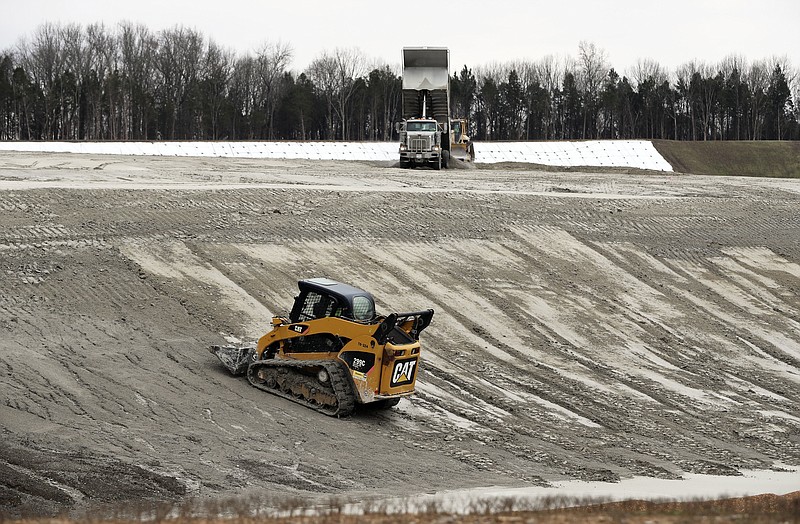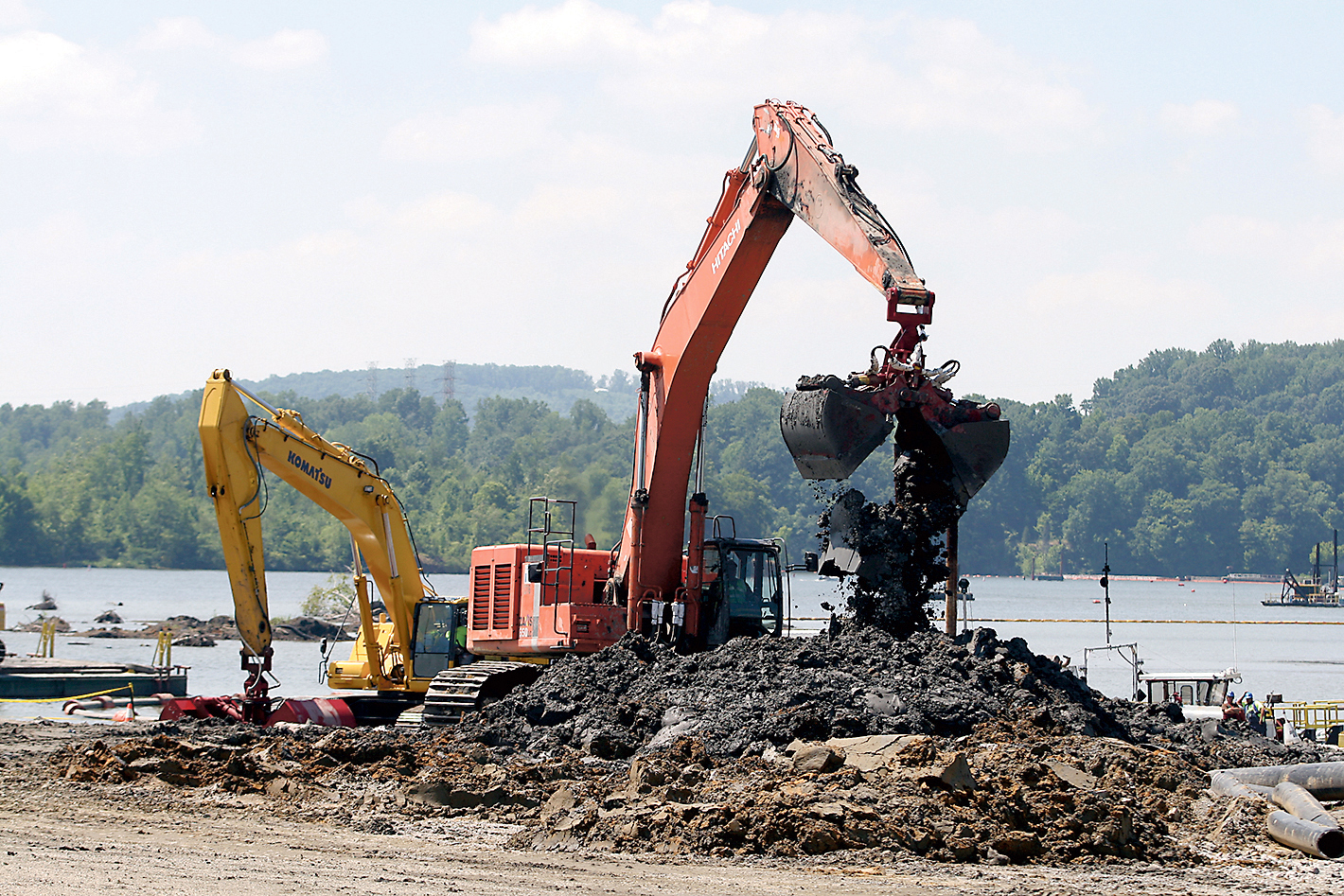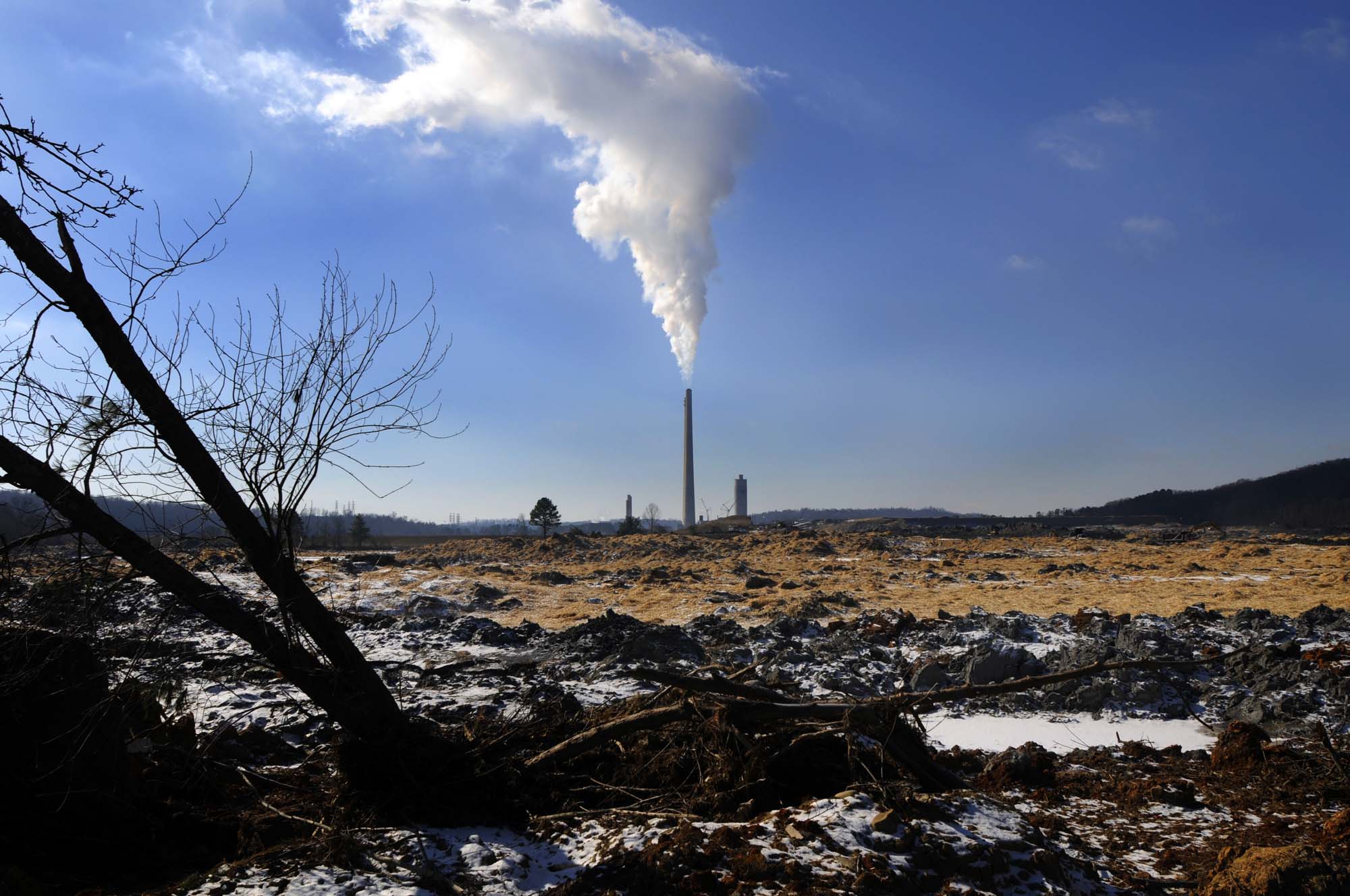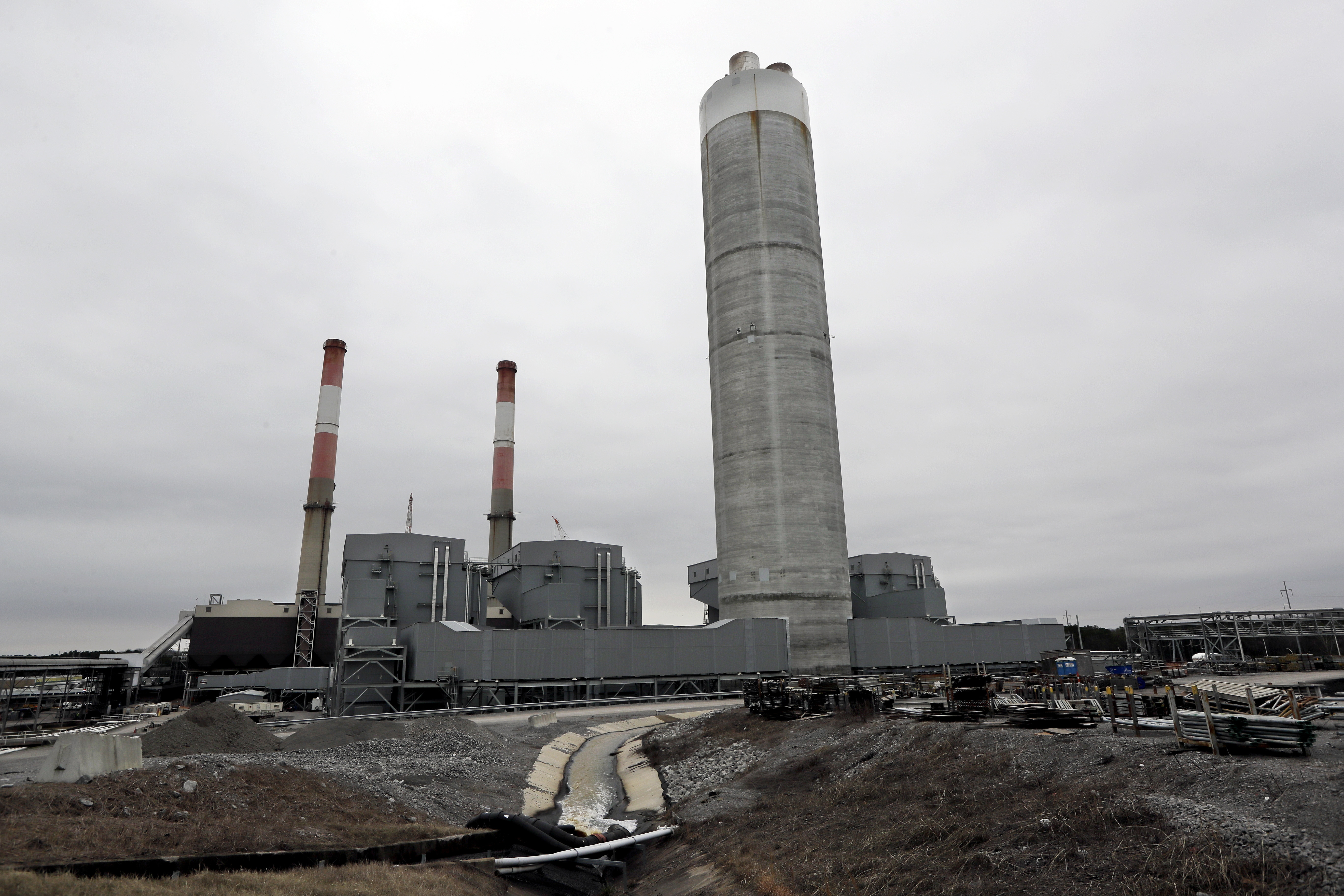 FILE - This Jan. 25, 2017 file photo shows the Gallatin Fossil Plant in Gallatin, Tenn. A federal judge on Friday, Aug. 4, 2017 ordered the nation's largest public utility to dig up its coal ash at Tennessee Valley Authority's Gallatin Fossil Plant and move it to a lined waste site where it doesn't risk further polluting the Cumberland River.(AP Photo/Mark Humphrey, File)
FILE - This Jan. 25, 2017 file photo shows the Gallatin Fossil Plant in Gallatin, Tenn. A federal judge on Friday, Aug. 4, 2017 ordered the nation's largest public utility to dig up its coal ash at Tennessee Valley Authority's Gallatin Fossil Plant and move it to a lined waste site where it doesn't risk further polluting the Cumberland River.(AP Photo/Mark Humphrey, File)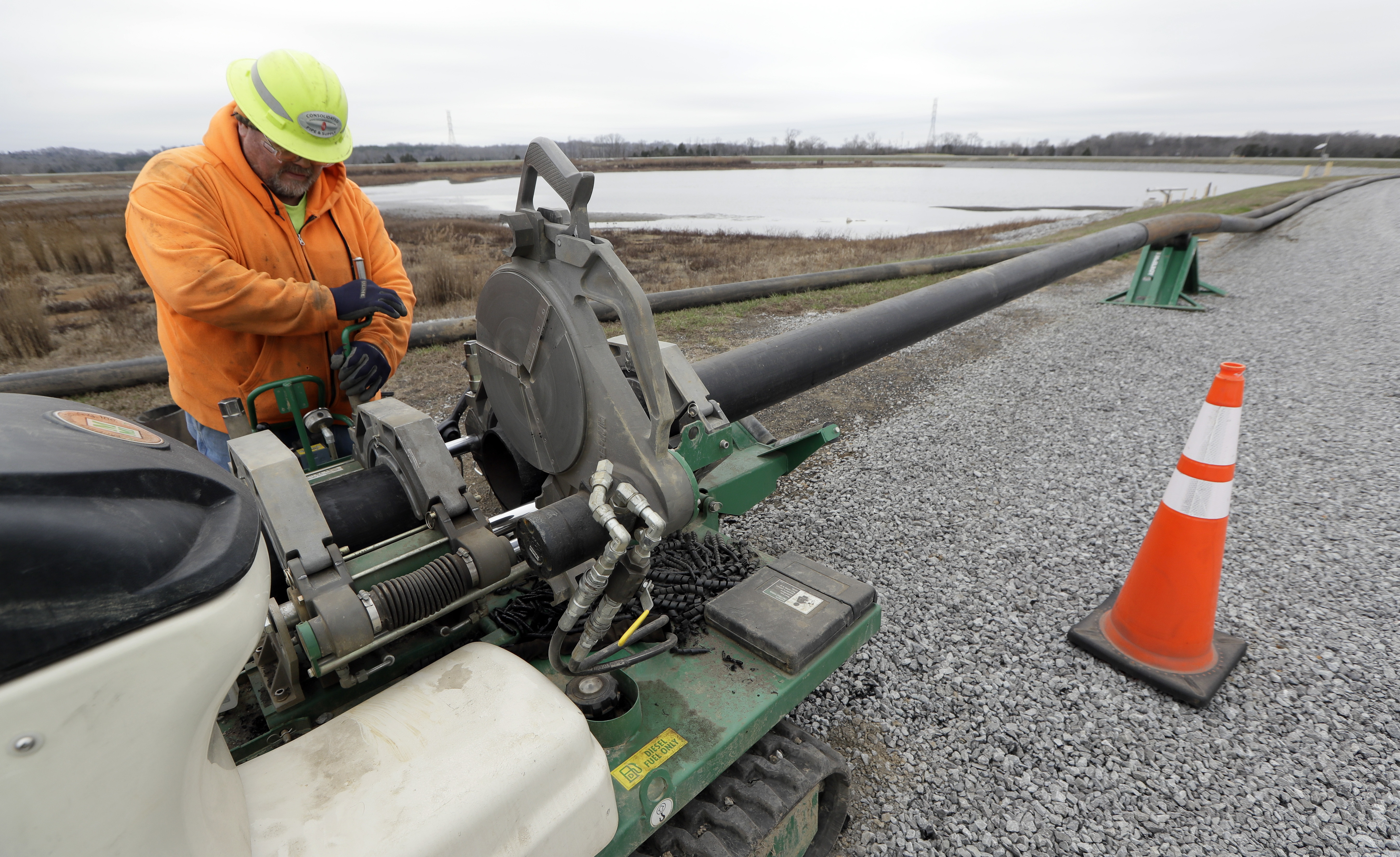 In this Jan. 25, 2017 photo, Richard Lawson heat welds sections of pipe together that will move water between ash storage ponds at Gallatin Fossil Plant in Gallatin, Tenn. Environmental groups are taking the Tennessee Valley Authority, the nation's largest public utility, to trial over whether waste from the coal-fired power plant near Nashville polluted the Cumberland River. A trial opens Monday, Jan. 30, in federal court in Nashville as the groups claim coal ash waste illegally seeped into the Cumberland River. (AP Photo/Mark Humphrey)
In this Jan. 25, 2017 photo, Richard Lawson heat welds sections of pipe together that will move water between ash storage ponds at Gallatin Fossil Plant in Gallatin, Tenn. Environmental groups are taking the Tennessee Valley Authority, the nation's largest public utility, to trial over whether waste from the coal-fired power plant near Nashville polluted the Cumberland River. A trial opens Monday, Jan. 30, in federal court in Nashville as the groups claim coal ash waste illegally seeped into the Cumberland River. (AP Photo/Mark Humphrey) A court-ordered plan to dig up and relocate coal ash stored at TVA's Gallatin Fossil Plant in Tennessee threatens to push up TVA's electricity prices without necessarily helping the environment more than capping the ash residues where they are now, TVA customers and 18 attorneys general said in new court filings.
TVA and its distributors and allies are fighting a ruling from U.S. District Judge Waverly Crenshaw in Nashville that TVA violated the Clean Water Act by dumping coal ash near the Cumberland River for decades. Crenshaw ruled last year in favor of the Tennessee Scenic Rivers Association and the Tennessee Clean Water Network, ordering TVA to remove more than 13 million cubic yards of coal ash that is piled up to 25 feet deep in unlined stilling ponds and dry storage.
"While the decision to build the Ash Pond Complex is in the past, the consequences of that decision continue today, and it now falls on the Court to address them," Crenshaw wrote in his decision last year. "The way to do so is not to cover over those decades-old mistakes, but to pull them up by their roots."
But TVA, which is appealing the ruling, estimates it will cost about $2 billion to excavate and truck out the ash, which could take 20 years of 50 to 100 truckloads a day.
TVA said it would cost about $230 million and may be safer and more environmentally friendly to keep the ash where it is and cover it with a cap.
TVA won an EPA environmental reclamation award for its cleanup and capping of coal ash at its Kingston Fossil Plant following the 2008 spillage of more than 5 million cubic yards of sludge into the Emory and Clinch rivers and destroyed nearby homes.
"We have proposed the same cap and closure at Gallatin," said TVA President Bill Johnson. "We think it is just as safe to cap the coal ash where it is and we think there are equal or greater chances of problems when you move the ash."
Crenshaw did not find that the toxic coal ash was leaking into the river, but he dismissed the cap and closure of the ash at the existing site, claiming that is "rolling the dice" for potential environmental problems in the future.
"If closure in place did prove inadequate, the likely, if not inevitable, result would be yet more litigation - and, of course, decade after decade of the public simply having to hope that whatever unplanned, incidental leakage that was coming from the impoundments was not enough to do them significant harm," the judge wrote.
The case involves a coal ash pit that has been abandoned since 1970 and the coal ash ponds still in use. The legal question, which Johnson said is likely to be appealed all the way to the U.S. Supreme Court, centers on whether states regulate underground coal ash residues or whether EPA has authority under the Clean Water Act.
"Like at Kingston, it was necessary to take TVA to court to force it to take responsibility for its coal ash pollution," Beth Alexander, an attorney with the Southern Environmental Law Center, said after the court ruling. "TVA will be required to do the right thing again, this time at Gallatin."
But Carlos Smith, a Chattanooga attorney who represents the Tennessee Valley Public Power Association, argued that digging up and removing the coal ash would be both economically and environmentally costly.
"The Court ignored the fact that two or three decades (or more) of digging up, disturbing, and transporting the coal ash via 50 to 100 truckloads per day through local communities could not only strain local infrastructures, but could also cause greater collateral water contamination and other environmental and safety hazards than would closing the ash in place," Smith said.
TVA also is being supported by 18 states, who argue in a court filing that the federal decision against TVA "creates an unprecedented extension of federal jurisdiction" into water regulations previously performed by the states.
"The lower court's expansion of federal jurisdiction to "hydrologically-connected" groundwater will increase administrative and legal costs to the States and their environmental protection agencies without materially improving environmental quality," Alabama Attorney General Steve Marshall and Kentucky Attorney General Andy Beshear argue in their brief.
The appeal is likely to take a year or more to hear and decide. In the meantime, Johnson said TVA is preparing to conduct environmental impact studies on the court-ordered ash removal.
Contact Dave Flessner at dflessner@timesfreepress.com or at 757-6340.
